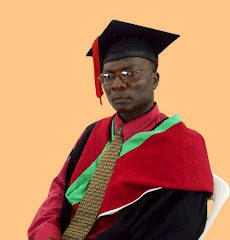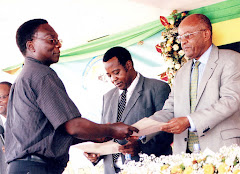Thursday, December 17, 2015
Hoseah sacked for ‘inefficiency’
PRESIDENT John Magufuli has revoked the appointment
of the Director General of the Prevention and Combating of Corruption Bureau
(PCCB), Dr Edward Hoseah, replacing him with his deputy, Mr Valentino Mlowola,
in an acting capacity. Dr Magufuli’s move follows what has been stated as
“unsatisfactory performance of the PCCB in tackling corruption cases’’,
especially in preventing loss of government revenue at the Tanzania Ports
Authority (TPA). In a statement issued to the media on Wednesday this week in Dar
es Salaam, the Chief Secretary, Ambassador Ombeni Sefue, said President
Magufuli made the decision after satisfying himself that “under Dr Hoseah, PCCB
will not keep up the pace that the president wants in fighting graft’’. “One of
the areas where the government is losing a lot of money is at the TPA and TRA;
so the president has stressed that despite reports of corruption at the two
operational offices for a long time, PCCB’s slow speed in addressing the issue
will not keep up with his work pace,’’ Ambassador Sefue noted.
Former Director General of the Prevention and Combating of Corruption Bureau
(PCCB), Dr Edward Hoseah,
Meanwhile,
President Magufuli has directed the suspension of four principal officers with
the PCCB who travelled out of the country despite the president’s ban on
foreign travel by government employees. The four are Ms Mary Mosha, Ms Ekwabi
Mujungu, Ms Doreen Kapwani and Ms Rukia Nikitas who travelled outside the
country despite being denied permission from the president or chief secretary. Ambassador
Sefue has called on all civil servants to abide by the president’s directive,
stressing that stern measures will be taken against those who will defy them. Meanwhile,
the Permanent Secretary in the President’s Office, Regional Administration and
Local Government, Mr Jumanne Sagini, has suspended the Babati District
Executive Director, Mr Mussa Natty, who before being transferred to Babati was
the Kinondoni Municipal Council Director. Mr Sagini said Mr Natty should report
back to Kinondoni Municipal Council to await a probe on the various allegations
leveled against him. The allegations include poor supervision that led to the
construction of sub-standard roads in the municipality, failure to take action
against his subordinates involved in the construction of the roads. Others
include unethical behaviour that has led to widespread public outcry on the
privatization of the Coco Beach in Dar es Salaam arising out of poor
supervision of urban and land use planning.
Nchemba issues one week to end problem
THE Minister for Agriculture, Livestock and Fisheries, Mr
Mwigulu Nchemba, has issued a one-week ultimatum to officers in his ministry to
outline problems mostly troubling wananchi and suggest solutions. Nchemba who
reported to the office, said members of the public have greater expectations on
the fifth government, so their wishes must be fulfilled; otherwise they will be
disappointed and decide never to vote. “I want each department to prepare a
summary of quick leads of all the problems facing the general public, as each
department is aware of those problems,” he directed. He added, “Each should
also give views on those problems and give out solutions,” The Minister said
that as each person was aware of their duties, fulfilling them was a must,
adding that most of the officials have been working in the ministry for a long time
and are aware of all the problems, it was high time to solve them.
THE Minister for Agriculture, Livestock and Fisheries, Mr
Mwigulu Nchemba, talking with the ministry's staff members when he made a familiarization tour of the ministry immeduiately after his appointment.
He added
that instead of giving excuses they should work together to find long lasting
solutions. If the problems are related to budget issues they should also be
analysed. Mr Nchemba gave an example of a football coach saying no matter how
good he is, if the players will not play well it is worthless. Adding, teamwork
was crucial in finding solutions to public grievances. Earlier, Deputy Minister
in the Ministry, Mr William Nashe, said 95 per cent of food production comes
from rural Tanzania, adding the ministry was very important to the country. “We
must all comply with President John Magufuli philosophy, we have all witnessed
what he has been doing and heard all the speeches so far,” he said. Mr Nashe
noted that, the President has directed them to remind all officials to fulfill
their responsibilities and stop business as usual attitude. He further insisted
that some of the words should be removed from their vocabularies including, ‘preparing
reports and process is underway’ and rather they should accomplish their duties
on time. The Deputy Minister insisted that all officials should focus on
results based performance, saying performing their duties was not enough but
doing something for the interest of public was crucial. He noted that as in the
ministry there are many experts and they should focus on finding best solutions
to communities’ problems.
Police to undertake security control at all major ports
Police force in the country has been ordered back to provide
security at all of the country’s major ports to check against rising cases of
loss of government revenue through corruption. The Minister for Home Affairs,
Charles Kitwanga made an order on Wednesday this week in Dar es Salaam by
giving reasons that they should take charge of security at the country’s main
ports to plug loopholes which had led to loss of billions in government revenue.
Kitwanga whose order comes at a time when the police and Tanzania Revenue
Authority are busy investigating loss of billions of shillings in import duty
and wharfage not paid by importers. “I wonder why we are still using private
security companies in our main ports while we have enough state security
machinery to take charge of the role,” the newly appointed minister noted as
the Director of Criminal Investigations moves to interrogate more Tanzania
Ports Authority officials of the so called wharfage committee formed by former
acting Director General, Madeni Kipande in 2013.
He said it was a big mistake
to remove state security officers from Dar es Salaam port three years ago
because since then, the security situation had deteriorated as crooks collude
with importers to dodge taxes. “Some 2,431 containers passed through Dar es
Salaam port without paying wharfage while another 349 did not pay any taxes,”
Kitwanga said, saying dishonest employees at both TPA and TRA were behind the
loss in government revenue. Meanwhile, members of the committee formed by
Kipande to take charge of all cargo destined for inland container depots and
cargo freight stations were blamed for loss of billions in wharfage fees and
were now facing police interrogation. So far the Police have only detained,
Rajah Mdoe who was Deputy Director General and Director of Finance for the
unpaid wharfage of thousands of containers and motor vehicles which disappeared
from inland container depots and cargo freight stations between 2013 and 2015. Police
spokesperson Advera Bulembo said they were interrogating a number of TPA former
and current employees but declined to mention names. “If we start mentioning
them then it’s obviously that it was not going to be an investigation, we will
let you know at later stage,” Bulembo said. Sources at the Dar es Salaam Port
Said, the acting Port Manager, Hebel Mhanga who chaired Kipande’s committee
since 2013, was summoned by investigators at the Director of Criminal
Investigations earlier this week. Mhanga is also accused of sitting on an audit
report which was submitted last June by TPA Internal Audit Manager, Amina
Makoko. Mhanga sat on the audit report which was leaked to the media last week
because his committee was directly responsible for the loss.
Tuesday, December 15, 2015
Board concerned over TAZARA business plan
BOARD of Directors
of the Tanzania - Zambia Railway Authority (TAZARA) has directed the management
to prepare a bankable business plan for the troubled railway line to stand on
its own as shareholding government find it increasingly difficult to continue
bailing it out. The directives are contained in a communiqué issued after a
TAZARA board of Director meeting held in Lusaka two weeks ago. The board said
it was concerned that the authority continued to underperform and depend on
subventions from shareholding governments despite directives that it should strive
to be self-sustaining in its operations. “Both Governments find it difficult to
justify the continuation of any subventions to TAZARA, which is otherwise a
potentially viable company, and insist that the Authority must stand on its own
going forward,” a statement issued by TAZARA spokesperson Conrad Simuchile
said. “We noted that the operational performance of the Authority has fallen to
record low levels of less than 90,000 tons of freight per year in the Financial
Year 2014/2015 from 208,538 tons recorded in the Financial Year 2013/2014.”
The
board directed the management to be proactive in handling challenges they face
and develop a clear marketing strategy for the railway company so as to retain
the current customers as well as win back old ones. According to the statement,
the management should consider the possibility of inviting the private sector
to invest and manage the Dar es Salaam Commuter Train, which is currently a
very popular service that is alleviating the transport challenges in the city
but remains a loss-making one. The board also approved a freight tonnage of
200,000 tons of freight and 1,980,000 passengers to be transported in the
Financial Year 2015/2016 after considering the proposed budget for the
Financial Year 2015/2016 and, taking into account the recent acquisition of new
locomotives and wagons. The statement further noted that it was expecting a net
operating profit of 1,689,544.00 US dollars from a total projected revenue of
45,808,960.00 US dollars against the total expenditure of 43,619,416.00 US
dollars for the Financial Year 2015/2016.
Mkapa advocates rule of law
Africa can only
develop if it manages to fight poverty with zeal and vigor while promoting good
governance and the rule of law. The statement was made last week by the former
President Benjamin Mkapa at a two-day National Rule of Law stakeholders’ forum
that was organized by the International Development Law Organization (IDLO) over
the weekend in Dar es Salaam. The former president described the rule of law as
a guiding necessary in creating wealth and sharing the benefits to society. “It
is further envisaged that the society will be empowered with capacity to hold
their leaders accountable, promote good governance, reward good performance and
curb corruption,” he told the gathering. “There is limited institutional
capacity to ensure full accountability from both government and the citizen,”
he admitted. “The governments are also constrained by pre-established and
widely accepted sets of rules of political engagement,” he added noting that
the forum would empower the public such that the citizenry understands their
share of responsibility and demand for government compliance to the principles
of due process. He further pointed out the main challenge in the endeavour to
strengthen the rule of law is limited due to meager resources for legal reform.
“So African countries seek support from development partners but unfortunately,
most of this support for rule of law reform has been coming with agendas that
take little account of the local context,” he said. “Too often, the result has
been technical solutions that fail to match local needs...” he said emphasizing
that “...it is crucial for legal reform processes be country driven.” He went
on to cite that Many facets of the rule of law form essential components of
sustainable development. “This was evident to me when in 2002 was appointed, together with the President of
Finland, to Chair the World Commission on the Social Dimension of
Globalisation...this conviction, grew even further after my joining the UN
Commission on Legal Empowerment of the Poor in 2006...one of the highlights of
the Commission’s work was the issue of rule of law and good governance,” he
detailed. “After three years of intensive research and consultations, we
proposed strategies for creating inclusive development initiatives that would
empower those living in poverty through increased protections and rights,” he
said. “In our final 2008 Report entitled Making the Law Work for everyone, we
argued that as many as 4 billion people worldwide are robbed of the chance to
better their lives and climb out of poverty, because they are excluded from the
rule of law,” the former president concluded.
Subscribe to:
Posts (Atom)














